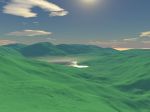What does a druid do on the winter solstice? That depends on the druid.
 If you’re a Reconstructionist, you don’t do much. There isn’t a whole lot of evidence that the ancient druids did anything to celebrate the two solstices and equinoxes; their high holy days were the four cross-quarter holidays (Imbolc, Beltane, Lughnasadh, and Samhain). The solstices and equinoxes aren’t even marked in the Coligny calendar, for example, while there is evidence there for Samhain, Lughnasadh, and Beltane.
If you’re a Reconstructionist, you don’t do much. There isn’t a whole lot of evidence that the ancient druids did anything to celebrate the two solstices and equinoxes; their high holy days were the four cross-quarter holidays (Imbolc, Beltane, Lughnasadh, and Samhain). The solstices and equinoxes aren’t even marked in the Coligny calendar, for example, while there is evidence there for Samhain, Lughnasadh, and Beltane.
If you’re a Revivalist, you celebrate Alban Arthuan, the festival to honor King Arthur and the return of the light. Druids commonly gather in a sacred space and watch for the sun to rise, greeting it with the powerful “Awen” chant, and honoring it with ceremony. However, the Revivalists are not dogmatic, and traditions vary widely among them.
I have called myself Reconstructionist on this site several times, but honestly I’m not quite sure about that.
I think it’s vital to separate what is really known about the druids from the traditions that have grown up about them in the past three hundred years — the wishful thinking, the projection of modern values back onto them, and the modern invented deities and festivals. But I absolutely believe that these newer traditions can be just as powerful as the ancient ones, and in my own experience, it’s been valuable to draw inspiration from both sources, as well as directly from my own connection with Spirit.
So I can see both points of view. My wife says that makes me a Revivalist…
Anyway, if you’re the Lilly family druids, you get up before dawn (which is not hard when the sun comes up at 7:14), and go play in a foot of snow while you wait for sunrise. Last year it was uncommonly warm, but utterly cloudless; this year was very cold, but completely overcast. When the time came, we had to take it on faith that the sun had come up — it was totally hidden by thick clouds. Somehow, though, the birds knew: they had been silent up till then, but suddenly on cue they lauched a battery of song at the skies.
So naturally we sang as well — “Here Comes the Sun”, “Mr. Sun”, and the perennial favorite, “Why Does the Sun Shine? (The Sun is a Mass of Incandescent Gas)“. The birds listened politely. Then we hung pine cones rolled in peanut butter and birdseed from the apple tree and put more birdseed in the feeder, and went in to have our own breakfast.
Our traditional breakfast is sausage biscuits. This ancient tradition dates from long ago when Daddy was a young boy, and his mother used to make them for him. Then we opened presents — Santa naturally comes to our house on the solstice — and had a jolly time.
Recently we’ve been avoiding electric lights when the sun goes down. Instead, we light candles throughout the house, and we really love it. For the children (and for us too, honestly), this makes dusk a magical time; the darkness closes around you, and each light in the house is a tiny flickering window into mystery. The children can’t dash around the house and go crazy the way they can when the house is flooded with electric light. They gather around the candles and look at books, and while my wife makes dinner I read wonder tales to them. Somewhere we have a book of Celtic wonder stories, and I would dearly love to have read to them from it, but it’s still boxed up from our move; so I read Yule stories to them from Starhawk’s Circle Round, and stories of world creation from a fantastic collection of native american indian tales; and when the Solstice actually came I switched over to the D’Aulaire’s Norse myths, which they have absolutely adored.
When Ymir lived long ago
Was no sand or sea, no surging waves.
Nowhere was there earth nor heaven above.
Bur a grinning gap and grass nowhere.
The sons of Bur then built up the lands.
Moulded in magnificence middle-Earth:
Sun stared from the south on the stones of their hall,
From the ground there sprouted green leeks.
Sun turned from the south, sister of Moon,
Her right arm rested on the rim of Heaven;
She had no inkling where her hall was,
Nor Moon a notion of what might he had,
The planets knew not where their places were.
The high gods gathered in council
In their hall of judgment. all the rulers:
To Night and to Nightfall their names gave,
The Morning they named and the Mid-Day,
Mid-Winter, Mid-Summer, for the assigning of years.
— Voluspa, trans. Auden & Taylor






Leave a comment